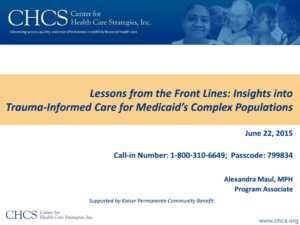
Health care organizations and delivery systems serving high-need, high-cost Medicaid populations are increasingly recognizing the prevalence of trauma among their patients and taking steps to adopt trauma-informed approaches to better address patient needs. Trauma-informed care seeks to change the clinical perspective from asking “What is wrong with you?” to “What happened to you?” and strives to create an environment that supports the unique needs of patients who have experienced trauma and staff who work with them. Using this approach to care can help providers build trusting relationships with individuals with a history of trauma, and may help enhance quality and cost outcomes for the Medicaid program overall.
This webinar, sponsored by Kaiser Permanente Community Benefit, provided an introduction to trauma-informed care and explored innovative strategies being used by two organizations implementing trauma-informed approaches to care. Participants learned about CareOregon’s experiences in building a trauma-informed workforce for its Health Resilience program. In addition, the Camden Coalition of Healthcare Providers (CCHP) highlighted CCHP’s cross-sector efforts to create a trauma-informed community in Camden, NJ.
Agenda
I. Introduction and Overview of Trauma-Informed Care for Complex Populations
Speaker: Alexandra Maul, Program Associate, CHCS
Alexandra Maul welcomed participants and introduce speakers. She then provided an overview of trauma-informed care and its relevance to the field of complex care.
II. Developing a Trauma-Informed Workforce: Lessons from the Health Resilience Program
Speaker: Laurie Lockert, Health Resilience Program Manager, CareOregon
Laurie Lockert described the work done by CareOregon’s Health Resilience Team and outlined successful practices for developing a trauma-informed workforce, including hiring, training, and supporting staff.
III. Community-Wide Systems Change: Creating a Trauma-Informed Community in Camden
Speaker: Victoria DeFiglio, Associate Clinical Director, CCHP
Victoria DeFiglio provided an overview of CCHP’s trauma-informed work within its patient population and highlighted innovative community transformation efforts taking place in the city of Camden.
A moderated Q&A session followed each presentation.
IV. Closing Remarks
Speaker: Alexandra Maul, Program Associate, CHCS